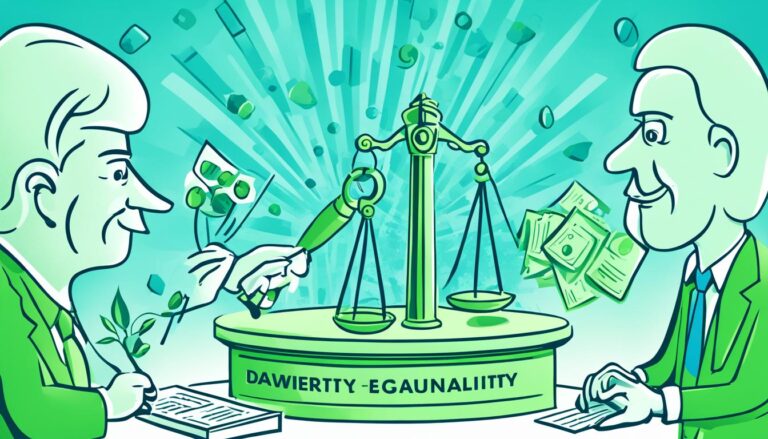Founders’ Agreement Essentials
Are you a startup founder? Have you ever wondered what would happen if one of your co-founders decided to leave the company?
Picture this scenario: you and your two co-founders have built a successful tech startup, but suddenly one of them decides to pursue a different path. Without a clear roadmap in place, chaos ensues, and the future of your company hangs in the balance.
This is where a founders' agreement becomes essential. By establishing a comprehensive founders' agreement, you can address crucial aspects such as ownership distribution, decision-making processes, and dispute resolution mechanisms, among others, ensuring the long-term stability and success of your startup.
Key Takeaways
- A founders' agreement is a crucial document that establishes a framework for collaboration and governance among founders, outlining their rights, responsibilities, and roles.
- Ownership and equity distribution should be carefully considered, taking into account factors such as contributions, expertise, experience, and future roles. Provisions for future equity distribution should also be included in the agreement.
- Clearly defining roles and responsibilities for each founder helps avoid confusion and overlap, ensuring everyone is on the same page regarding dedication to the company.
- Decision-making processes should be established to promote collaboration and inclusivity, with a tie-breaker mechanism in place for situations where consensus cannot be reached. Effective decision-making is essential for maintaining a harmonious working relationship.
Purpose of a Founders' Agreement
The purpose of a Founders' Agreement is to establish a comprehensive framework for the collaboration and governance of a startup company. It's a crucial document that outlines the rights, responsibilities, and roles of each founder, as well as the procedures for decision-making, ownership, and equity distribution.
One of the key benefits of having a Founders' Agreement is that it helps prevent misunderstandings and conflicts among the founders. By clearly defining each founder's contributions, obligations, and expectations, the agreement minimizes the risk of disputes and promotes a harmonious working relationship. It also provides a mechanism for resolving any disagreements that may arise in the future, ensuring that the company's best interests are always prioritized.
Another important aspect to consider when drafting a Founders' Agreement is the importance of seeking legal advice. While it may be tempting to draft the agreement without professional help to save costs, it's crucial to have a lawyer review and provide guidance on the legal implications of the agreement. Legal advice can help ensure that the agreement is legally enforceable and protects the founders' rights and interests.
Legal and Binding Nature
As you move forward in drafting a Founders' Agreement, it's important to understand the legal and binding nature of this document. A Founders' Agreement is a legally binding contract that outlines the rights, responsibilities, and obligations of the founders of a company. It's crucial to take into consideration the legal implications associated with this agreement to ensure its enforceability and validity.
The legal implications of a Founders' Agreement are significant. This document serves as a basis for resolving disputes, protecting intellectual property, and establishing ownership rights. By clearly defining the terms and conditions that govern the relationship between founders, it provides a solid framework for the smooth operation of the business.
To ensure the enforceability of the agreement, it's important to abide by certain legal requirements. These may include the use of clear and unambiguous language, the presence of consideration, and the consent of all parties involved. Additionally, it's crucial to comply with any relevant laws or regulations that may affect the agreement.
The validity of a Founders' Agreement depends on various factors, such as the capacity of the parties involved, the absence of coercion or undue influence, and the absence of any illegal or prohibited clauses. It's advisable to seek legal advice when drafting this agreement to ensure its validity and compliance with applicable laws.
Ownership and Equity Distribution
When it comes to ownership and equity distribution, you must carefully consider how to allocate shares in your company. Equity allocation refers to the process of distributing ownership stakes among founders and other stakeholders. It's crucial to establish a fair and equitable ownership structure from the start, as it can help avoid conflicts and disputes later on.
To determine the equity distribution, founders typically consider various factors such as the level of contribution, expertise, and experience each founder brings to the table. Additionally, future roles and responsibilities, as well as the anticipated growth and success of the company, should be taken into account. It's essential to have open and honest discussions about these matters and document the agreed-upon ownership percentages in your founders' agreement.
Furthermore, it's important to remember that equity allocation may change over time. As your company grows and new investors come on board, the ownership structure may need to be adjusted. Therefore, it's crucial to include provisions in your agreement that outline how equity will be distributed in the event of future investments or the introduction of new team members.
Roles and Responsibilities of Each Founder
To ensure effective collaboration and accountability, clearly define the roles and responsibilities of each founder in your company's operations. Assigning specific roles and responsibilities is crucial for the smooth functioning of your startup. Start by discussing and deciding on the key areas where each founder will be responsible. This could include areas such as product development, marketing, finance, operations, and human resources.
Clearly define the scope and expectations for each role to avoid any confusion or overlap in responsibilities.
In addition to defining roles, it's important to discuss compensation and time commitment. Determine how the founders will be compensated for their efforts and contributions to the company. This could include a combination of salary, equity, and profit-sharing arrangements. It's equally important to discuss the expected time commitment from each founder. This will help ensure that everyone is on the same page regarding the amount of time and effort they need to dedicate to the company.
Decision-Making Processes
Establishing a clear decision-making process among founders is essential for effective and efficient management of your startup. When it comes to making important decisions that can shape the future of your company, it's crucial to have a structured approach in place.
One way to ensure that decisions are made collectively is by using a group consensus model. This means that all founders have an equal say in the decision-making process, and a decision is only made when everyone agrees. This approach promotes collaboration, transparency, and inclusivity among the founders.
However, in some cases, reaching a consensus may not be possible, or it may lead to delays. In such situations, it's important to have a tie-breaking mechanism in place. This could be a designated founder or an external advisor who's the authority to make the final decision when there's a deadlock.
Having a tie-breaking mechanism ensures that decisions can still be made in a timely manner, even when there's disagreement among the founders. By establishing a clear decision-making process and incorporating mechanisms for both group consensus and tie-breaking, you can foster effective decision-making and maintain a harmonious working relationship among the founders.
Intellectual Property Rights
To effectively manage your startup and continue building a harmonious relationship among founders, it's crucial to understand and establish clear guidelines for intellectual property rights. Intellectual property refers to the creations of the mind, such as inventions, designs, and brand names, that have commercial value.
Here are four key considerations when it comes to intellectual property rights:
- Identify ownership: Determine who owns the intellectual property created by each founder. This should be clearly defined in the founders' agreement to avoid any disputes in the future.
- Legal requirements: Familiarize yourself with the legal requirements for protecting intellectual property. Research the specific laws and regulations in your country or jurisdiction to ensure compliance.
- Patent protection: Consider whether your startup's innovations are eligible for patent protection. Patents provide exclusive rights to inventors, preventing others from using or selling their inventions without permission.
- Confidentiality: Establish protocols to protect confidential information and trade secrets. Implement non-disclosure agreements (NDAs) and other measures to safeguard sensitive information from being shared or misused.
Vesting and Founder's Stock
When it comes to managing your startup and ensuring a fair distribution of ownership, understanding vesting and founder's stock is essential. A Founder's Agreement outlines the terms of ownership and the rights and responsibilities of each founder.
Vesting refers to the process by which founders earn their ownership stake over a specified period of time. This is important because it prevents founders from leaving the company early and taking a significant portion of the company's equity with them.
Vesting also has tax implications. If founders receive their shares upfront, they may be subject to immediate taxation. However, with a vesting schedule in place, founders can defer the tax implications until they've earned their shares. This can be beneficial as it allows founders to potentially qualify for long-term capital gains tax rates.
Furthermore, vesting and founder's stock have financial implications. By implementing a vesting schedule, the company can protect itself from underperforming founders or those who leave early. If a founder leaves before fully vesting, the company can repurchase the unvested shares at a predetermined price. This ensures that the remaining founders and the company aren't burdened with inactive or uncommitted shareholders.
Dispute Resolution Mechanisms
After understanding vesting and founder's stock, it's important to consider the implementation of effective dispute resolution mechanisms in a Founder's Agreement. Disputes among founders can arise at any time, and having a clear process in place for resolving them can help prevent unnecessary conflicts and protect the interests of all parties involved.
Here are four key considerations when it comes to dispute resolution mechanisms:
- Mediation vs Arbitration: Mediation involves a neutral third party assisting the parties in reaching a mutually agreeable solution, whereas arbitration involves a third party making a binding decision on the dispute. Consider which approach aligns better with your goals and the specific nature of potential disputes.
- Negotiation Techniques: Effective negotiation techniques can help in resolving conflicts amicably. It's crucial to approach negotiations with an open mind, actively listen to the other party's perspective, and be willing to find mutually beneficial solutions.
- Clearly Defined Procedures: A well-drafted Founder's Agreement should outline the specific procedures to follow in case of a dispute. This includes defining the steps involved, such as initial discussions, mediation or arbitration, and any applicable timelines.
- Governing Law and Jurisdiction: Specify the governing law and jurisdiction that will apply to any disputes. This ensures consistency and clarity in the resolution process.
Confidentiality and Non-Disclosure
When it comes to a founders' agreement, confidentiality and non-disclosure are crucial aspects that you need to address. These obligations are legally binding and ensure that sensitive information, such as trade secrets, is protected.
Legal Obligations for Confidentiality
To ensure the protection of sensitive information, founders must establish clear legal obligations for confidentiality through a comprehensive Confidentiality and Non-Disclosure agreement. By doing so, you can safeguard your proprietary knowledge and prevent unauthorized disclosure or use. Here are four essential elements to include in your agreement:
- Definition of confidential information: Clearly specify what constitutes confidential information to avoid any ambiguity.
- Obligations of the receiving party: Clearly outline the responsibilities of the recipient to maintain confidentiality and prohibit any unauthorized use or disclosure.
- Duration of confidentiality: Define the duration for which the information must remain confidential, ensuring it continues even after the termination of the agreement.
- Legal consequences and enforcement measures: Clearly state the consequences for breaching the agreement, including potential legal action and remedies.
Protection of Trade Secrets
To effectively safeguard your trade secrets, it's crucial to establish robust measures for confidentiality and non-disclosure. This builds upon the foundations laid out in the previous discussion on legal obligations.
Trade secret protection is vital for startups and founders. It ensures that valuable information, such as customer lists, manufacturing processes, or software algorithms, remains confidential and exclusive to your business.
By implementing strict confidentiality and non-disclosure agreements, you can prevent unauthorized disclosure or use of your trade secrets by employees, contractors, or business partners.
Additionally, trade secret enforcement plays a crucial role in protecting your intellectual property rights. In the event of a breach, it's important to have mechanisms in place to take legal action and seek remedies for any damages caused.
Termination and Exit Strategies
Now let's talk about termination and exit strategies.
When it comes to founders' agreements, it's important to consider buyout options, vesting schedules, and non-compete agreements. These elements play a crucial role in ensuring a smooth transition in case one of the founders decides to leave or the company needs to be dissolved.
Buyout Options
Consider the various buyout options available to ensure a smooth termination and exit strategy for your founders' agreement. When it comes to buyout negotiations, there are several valuation methods you can explore to determine a fair price for the departing founder's shares.
Here are four common options to consider:
- Fixed Price Buyout: This option sets a predetermined price at which the departing founder's shares will be bought out. It provides clarity and avoids potential disputes over valuation.
- Formula-Based Buyout: This option uses a predefined formula, such as a multiple of earnings or book value, to determine the price of the shares. It offers a more objective approach to valuation.
- Market-Based Buyout: This option involves selling the departing founder's shares to a third party or on the open market. The price is determined by market forces and can provide a fair market value for the shares.
- Arbitration-Based Buyout: This option involves appointing an independent arbitrator to determine the price of the shares. It provides an unbiased valuation process and can help resolve disputes.
Vesting Schedules
One crucial aspect of ensuring a smooth termination and exit strategy for your founders' agreement is implementing effective vesting schedules.
Vesting schedules determine when founders' shares fully vest and become available. To provide an added layer of protection, vesting acceleration can be included in the agreement. Vesting acceleration allows founders to speed up the vesting of their shares in certain situations, such as a change in control or acquisition.
Additionally, cliff periods can be incorporated into the vesting schedule. Cliff periods require founders to remain with the company for a specific period of time before any shares start vesting. This encourages founders to stay committed to the company and prevents short-term founders from benefiting from the agreement without contributing long-term value.
Non-Compete Agreements
To continue safeguarding the interests of all parties involved, it's crucial to address non-compete agreements as part of your termination and exit strategies in the founders' agreement. Non-compete agreements impose legal restrictions on founders and prevent them from starting or joining competing businesses for a specified period of time after leaving the company.
Here are four key points to consider when including non-compete agreements in your founders' agreement:
- Scope: Clearly define the activities and industries that are considered competing businesses to provide clarity and prevent any potential disputes.
- Duration: Specify the length of time during which founders are restricted from engaging in competing businesses to protect the company's competitive advantage.
- Geographic Limitations: Determine the geographical areas in which founders are prohibited from starting or joining competing businesses to prevent them from directly competing in the same markets.
- Remedy for Breach: Establish the consequences for breaching the non-compete agreement, such as monetary damages or injunctive relief, to enforce compliance and protect the company's interests.
Conclusion
In conclusion, a founders' agreement is an essential document that outlines the key aspects of a startup's operations.
By clearly defining ownership and equity distribution, roles and responsibilities, decision-making processes, and dispute resolution mechanisms, founders can avoid potential conflicts and ensure a smooth operation.
Additionally, the inclusion of confidentiality and non-disclosure clauses protects sensitive information.
Overall, a well-drafted founders' agreement sets the foundation for a successful and harmonious entrepreneurial journey.
So don't delay, start drafting your founders' agreement today!







